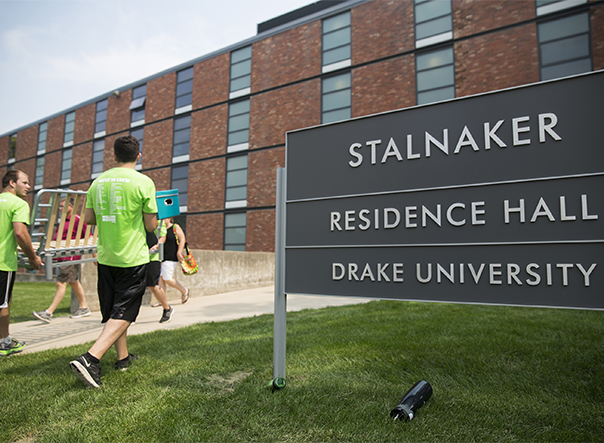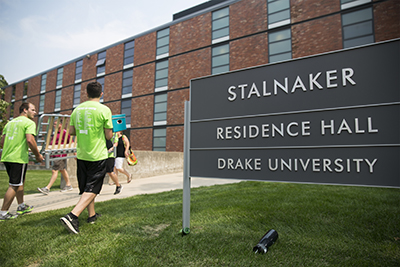Pillows, blankets, and boxes line the curb outside Stalnaker Residence Hall. That can only mean one thing—it’s move-in day, and hundreds of first-year students are preparing to say goodbye to their loved ones and hello to their new home at Drake. You might remember the feeling, dropping your belongings off curbside—a little overwhelmed, but more excited than anything.
Without a doubt, the college experience today looks different than in years past. You may remember residence life as it was immortalized in this 1987 MTV commercial:
Facebook, Twitter, Instagram, and Snapchat have changed the way Drake students connect. But despite the popular digital communities, students, faculty, and staff argue that the strongest community remains the one formed on campus.
“I remember feeling stressed out as I pulled up to Carpenter,” recalls Domenic Lamberti, now a senior, studying law, politics, and society. “But I instantly felt welcomed. I wasn’t expecting to have a support system like that.”
At summer orientation, Lamberti remembers meeting many people and connecting with them online. But he quickly realized the online connection was only surface level. The programming provided by the Office of Residence Life (ORL) and his First Year Seminar (FYS) allowed him to truly get to know the folks he was living with.
“We don’t all sit in our rooms with our doors closed, headphones in, and laptops on,” says Lamberti. “There are tons of opportunities to unplug and make friends.”
In the first six weeks, the ORL facilitates programming to help new students acclimate and engage with other students. (Even upperclassmen can continue to connect through programming opportunities.)
Students also build relationships through their FYS classes, which are structured as learning communities in which classmates are also campus neighbors. This environment helps students grow both socially and intellectually.
“The FYS model is more impactful because of the living component,” says Ann Miller, associate dean of students. “College comes with so much more than just coursework. You’re living on your own for the first time, building relationships, and making your own decisions. You need support.”
In the digital era, it can be easy to underestimate the value of moving away to college when technology has the ability to connect people around the globe. But nothing can replace face-to-face interaction.
“Our society needs to be reminded that the in-person college experience as well as the integration of the liberal arts with professional preparation are essential, profound, transformative, live-changing experiences,” says Craig Owens, associate professor of English and an FYS instructor. “Facebook is ‘relevant,’ but a Drake education is transformative.”



